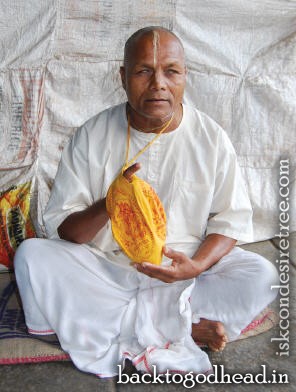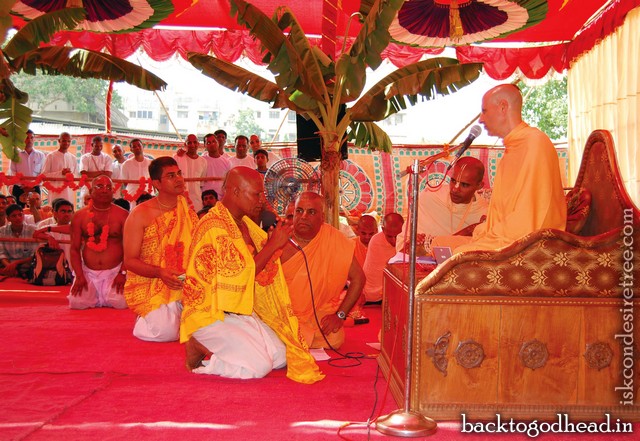
I first heard about Bilvamangala Thakura Dasa, who is blind, when I arrived at the ISKCON temple in Belgaum, Karnataka, where he lives. When I saw him at the early-morning mangala-arati, he was dancing and singing joyfully, and shouting “Gauranga!” and “Jaya Srila Prabhupada!” Later he sat down to chant his japa and after a short break joined in Guru-puja and the Bhagavatam class.
His day begins before 3:00 A.M. He chants all the prayers sung during mangala-arati, even the prema-dhvani prayers (jaya om vishnupada, etc.), during which he bows down. Then he begins japa. At 4:30 someone escorts him to the temple for mangala-arati. After the morning program, he honors prasadam. Then throughout the day he chants, taking breaks to honor prasadam and attend to bodily needs. In the evening he again sings songs and prayers in glorification of the Supreme Lord and His devotees. He does not need drums or cymbals; when he is standing he claps his hands and dances, and when he is sitting he beats his hand on his thigh. Most of the day and night, he either chants or sings.
To learn more about him, I interviewed him and also spoke with Uttama Sloka Dasa and Nagendra Dasa. Some excerpts from his life story follow.
The Pull of God
Bilvamangala Thakura Dasa was born the eldest of three siblings in 1949. The family priest told his mother to name the child Narayana. Young Narayana was fond of listening to the abhangas (devotional poems) of Tukarama Maharaja, the great Vaishnava saint of Maharashtra. He would memorize them and recite them, along with stories of the Lord, to his friends and family members. Most of his listeners, however, were not interested, being caught up in worldly duties, yet they marveled at the child’s devotional proclivities.
At the age of ten Narayana contracted an eye ailment that pestered him for a year, finally claiming both his eyes. He had to discontinue his education. His solace was a tape recorder that played bhajanas and kirtanas.
Many years later, his younger brother came in touch with the Hare Krishnas and began to chant and even induced the family members to accept Krishna consciousness. Narayana took time to be convinced, but once he started chanting he developed a taste for the holy names. He gradually began to chant more rounds: 20, 32, and sometimes even 64. Soon he became a regular visitor to the temple, along with his brother Prahladananda Dasa and the entire family.
After his mother’s death in 2001, he was inspired to move into the temple. The resident devotees were skeptical. “How can we have a blind man in the temple? Who will take care of him?”
The temple president, Devamrta Dasa, intervened.
“I knew of Narayana’s profound taste in the holy name,” he says. “If he could adjust to temple life, we had no problem with his living with us.”
Narayana moved into a small, shared room and quickly adapted to his new surroundings. He was neat and clean and only needed help from someone to get him prasadam and take him to the temple. Without help, he bathed, shaved his face, washed his clothes and dried them, and took care of his belongings.
His spirits see no barrier. With the help of devotees and the free train passage allowed by the government, he has gone on pilgrimage to Mayapur, Vrindavana, Jagannatha Puri, and Tirupati.
In 2008 he received harinama initiation and got the name Bilvamangala Thakura Dasa, after the great blind saint of Vrindavana famous for his poems glorifying the Supreme Lord Krishna.
Firm Faith in the Holy Name
Following are some excerpts from the interview with him on behalf of Back to Godhead:
BTG: You have lost your vision. Do you feel that God did an injustice to you?

Bilvamangala Thakura Dasa (BTD): I used to feel bad, but not now, after coming to bhakti. Now I feel that because I don’t have vision, the Lord has kept me here in His service.
BTG: Still, you cannot see the deity in the temple. Don’t you feel bad about that?
BTD: I don’t. The Lord is present in His name. Lord Krishna has said, “Chant My name, and I will be with you.” I feel that. A few days ago I fell down near the gate and was injured. I sensed the Lord assuring me, “Don’t fear; I am with you.” Although I went to the doctor, I had no faith in him; I had full faith in the Lord, and eventually the Lord cured me.
BTG: How can you chant so much?
BTD: I don’t get much sleep, one or two hours at the most. When I am awake I take shelter of the Lord, and He gives me mercy. I feel that if I surrender to Him, it will be good.
BTG: What gives you a taste in chanting?
BTD: Tulasi Devi gives the taste, and Krishna. I pray to my chanting beads before chanting. A few years ago, I had a dream in which Srila Prabhupada came and told me to take shelter of Tulasi Devi. Here [pointing to a garden on his right] is Tulasi. Every day I bow to her and sing her prayers. And I live here in this courtyard, and do my bhajana and kirtana. Sometimes I chant thirty-two rounds, sometimes more. And on Ekadasi I fast and chant sixty-four rounds or more.
BTG: Have you read Srila Prabhupada’s books?
BTD: No. I only studied till fourth standard, but I regularly hear temple classes.
BTG: What is your message to our readers?
BTD: Do devotional service. Take shelter of Lord Krishna. You will be benefited. What I did, you can also do. You will get mercy from the Lord, and you will move ahead. If He does not have mercy on you, you cannot do anything. Here I am, a blind man, but He is taking care of me. Even if I keep servants, they will not take care of me as nicely as these devotees are doing. How much more will He take care of you? So, just take shelter of the Lord.
BTG: Thank you.
Later Uttama Sloka recalls an anecdote: Once when Devamrta Dasa, the temple president, returned to the temple after a trip, many devotees approached him with various complaints. But he found Bilvamangala Thakura blissfully chanting kirtana and dancing.
“Bilvamangala Thakura is an inspiration to so many of us,” Devamrta says. “The whole day he is immersed in harinama.”
A Clear Vision
I return to my room. Outside a train rushes past, loudly whistling and shaking the earth with its massive wagons carrying petrol. I look out of the window at the speeding train and think about the modern world that is so rapidly turning atheistic. Brilliant scientists, scholars, philosophers, writers, common people all appear to be ignorant of God and going away from Him. People with eyes fail to perceive the role of God in universe, while Bilvamangala Thakura Dasa, without vision, can clearly perceive the hand of God in his life. He sees God in His names and realizes His mercy in the love and support that appears internally in his heart and externally in the kindness of devotees. The divine songs that may seem to us ordinary words reveal their transcendental potency to him so much so that nearly all day and night he joyfully sings them. The process of devotional service that may appear tedious to us becomes a natural asylum for him. His faith and satisfaction in the process of devotional service is real.
One marvels at the power of the process of bhakti, which can cut across any material impediments to reveal the ultimate truth. And one marvels at the all-attractive Supreme Lord, who by His unlimited power can give a blind man faith and divine vision.
With so many manifestations of the glories of the process of devotional service clear before my eyes, I can only offer my prayers, repeating the words of the original blind saint Bilvamangala Thakura, who writes in his celebrated book Krishna-karnamrta: “My dear Lord, You are the ocean of mercy. With my arms placed above my head, I bow down before You with all humility and sincerity. I am praying unto You, my Lord. Would You please sprinkle a little of the water of Your glance upon me? That will be my great satisfaction.”
Murari Gupta Dasa, a disciple of His Holiness Radhanatha Swami, has a Bachelor’s degree in medicine and surgery (M.B.B.S.) and is part of the production team of the Hindi and English editions of BTG in India. In compiling this article, he acknowledges the help of Uttama Sloka Dasa, Nagendra Dasa, Atula Krishna Dasa, and Devamrta Dasa.
